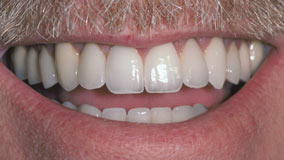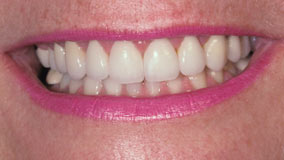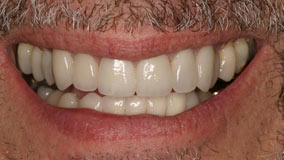Post-Operative Care Instructions
Post-Operative Instructions For Oral Surgery
Thank you for coming to our office for your oral surgery treatment. Your treatment continues until your healing is complete. In the event you feel your post-operative course is marked by excesses of pain, swelling or bleeding do not wait for your next appointment with Dr. Miller to return. Call 503-640-9310 at any time. If we are not in the office, the answering service will page the doctors for you in an emergency.
Things to Expect:
- Swelling: This is normal following a surgical procedure in the mouth. It should reach its maximum in 48-72 hours and decrease thereafter. Facial bruising can also occur.
- Discomfort: The most discomfort you will experience will be during the period immediately after sensation returns to your mouth.
- Bleeding: Some slight bleeding or “oozing” for the first 24-36 hours is common.
Things to Do:
- Bleeding: Keep your head well elevated for the first 24 hours. Bite on the gauze placed in your mouth at the end of the procedure for at least one hour. If bleeding continues or is excessive, remove all excess blood clots and old gauze. Place clean damp gauze over the bleeding area and hold firmly in place for 15-20 minutes so that no blood escapes. Repeat this procedure several times. If bleeding continues, bite on a damp tea bag for 20 minutes.
- Swelling: Some swelling is to be expected; however, it may be minimized by the immediate use of ice or cold packs applied to the face over the surgical site. We will give you an ice pack to be applied during the ride home. It is important to start as soon as possible after surgery and continue for 24 hours applying the icepack for 20 minutes followed by 20 minutes without.
- Diet: After 1 hour, you should be able to take fluids by mouth. A liquid diet is desirable for the first day. At a minimum, only eat soft foods in the first 24 hours. Force liquids, an intake of at least 2 quarts a day is essential.
- Medications: Take all medications as directed, as they will help control pain and prevent infection.
- Mouth Rinse: We will give you Biotene mouth rinse. Rinse with the Biotene 2-3 times per day at least until your post-operative check. Do not brush teeth in the area of surgery for the first 2 days afterward. Any exposed membrane should be gently swabbed with a cotton swab soaked in Biotene several times per day.
Things Not to Do:
- Avoid smoking for 8 weeks postoperatively, spitting or drinking with a straw for the first 24-48 hours following surgery. These can cause bleeding to re-occur.
- Don’t apply heat to the face or eat any hot food or drink for the first 24-48 hours, as this will increase swelling.
- Avoid any vigorous physical activity for the first 24 hours, as this may cause bleeding to re-occur or swelling.
- If you have had a sinus graft, avoid blowing your nose, sneezing, coughing or anything that will create extra pressure in the sinus cavity. If you must sneeze or cough, keep your mouth open.
Post-Op Instructions For Conscious Sedation Patients
- The type of drugs used in the conscious sedation process will cause short-term amnesia. You should not plan on making major decisions for 24 hours after your procedure.
- Do not drive or operate machinery for twelve hours following the procedure.
- For longer appointments under conscious sedation, you should not plan on any activities for the remainder of the afternoon. This will depend on the type of sedation used.
- Avoid biting or tooth brushing around the site until we see you for your follow-up visit. Eat soft foods for a few days following surgery.
- Should you have any questions or concerns following your procedure, please call our office. If it is after hours, the answering service will contact Dr. Miller for you if requested to.
Implant Post-Op Instructions
You have just completed the first step of your implant treatment. Proper care of your mouth will aid in the healing process and reduce the possibility of complications. The following instructions will assist you in this healing phase.
- Following the procedure, you may find it advisable to take it easy for a day or two. Usually, the fewer implants placed, the sooner you will feel comfortable returning to normal activities. Jogging and vigorous activities should be avoided for a few days.
- You may experience some swelling after the procedure. Ice packs will keep swelling and/or bruising to a minimum. Apply ice to your face on a “15 minutes on, 15 minutes off” cycle for the remainder of the day if possible. If swelling persists after 48 hours, apply a warm moist towel.
- You may have some discomfort after the procedure. The amount of this discomfort depends on a number of factors including the number of implants placed and where they were placed. Over the counter anti-inflammatory medicines (Advil, Aleve or Ibuprofen) are often helpful in controlling this type of discomfort. We will also prescribe “stronger” pain medication. You may supplement the anti-inflammatory medication with this prescription medication if needed. You do not have to take or finish the pain medication.
- We may prescribe an antibiotic for you. Unlike the pain medication, it is important that you finish this medication unless otherwise directed.
- There is usually a minimal amount of bleeding following the procedure. We suggest that you bite on the gauze packing in your mouth for at least 20-30 minutes. If you notice bleeding from the area after the first 30 minutes, place another gauze pad over the area. Some oozing may occur for a day or two after the surgery.
- Rinsing is very helpful in keeping your mouth clean. Warm salt-water rinses or Biotene should be started the day after surgery. Rinse gently several times a day and continue to do so for ten to fourteen days.
- Do not attempt to floss, brush or water-pik in the area of surgery for the first two weeks. Keep your mouth clean with warm water rinses. Following the healing period, you will be instructed on further cleaning techniques. The rest of your mouth should continue to be cleaned as usual.
- Diet is very important in the postoperative period. We would like you to eat soft nutritious foods. Care should be taken to avoid hard or crunchy foods that might cause trauma to the implant area. Gently rinse with warm water after every meal.
- Smoking should be avoided for at least two weeks following surgery. This has been shown to negatively affect the healing process.
- We will let you know when dentures or partial dentures may be worn after surgery.
- Stitches will be removed in 7-10 days after your surgery.
Your patience and self-care will help make your dental implant successful. If you have any questions or unusual problems, please call us at any time at (503)640-9310.
Post Operative Instructions For Sinus Lift
Thank you for coming to our office for your oral surgery treatment. Your treatment continues until your healing is complete. In the event you feel your post-operative course is marked by excesses of pain, swelling or bleeding do not wait for your next appointment to return. Call 503-640-9310 at any time. If we are not in the office, the answering service will page the doctors for you in an emergency.
Things to Expect:
- Swelling: This is normal following a surgical procedure in the mouth. It should reach its maximum in 72 hours and decrease thereafter.
- Discomfort: The most discomfort you will experience will be during the period immediately after sensation returns to your mouth.
- Bleeding: Some slight bleeding or “oozing” for the first 24-36 hours is common.
- Blood from the nostril on the side of the sinus lift is acceptable.
Things to Do:
- Bleeding: Keep your head well elevated for the first 24 hours. Bite on the gauze placed in your mouth at the end of the procedure for at least one hour. If bleeding continues or is excessive, remove all excess blood clots and old gauze. Place clean damp gauze over the bleeding area and hold firmly in place for 15-20 minutes so that no blood escapes. Repeat this procedure several times. If bleeding continues, bite on a damp tea bag for 20 minutes.
- Swelling: Some swelling is to be expected; however, it may be minimized by the immediate use of ice or cold packs applied to the face over the surgical site. We will give you an ice pack to be applied during the ride home. It is important to start as soon as possible after surgery and continue for 24 hours applying the icepack for 20 minutes followed by 20 minutes without.
- Diet: After 1 hour, you should be able to take fluids by mouth. A liquid diet is desirable for the first day. At a minimum, only eat soft foods in the first 24 hours. Force liquids, an intake of at least 2 quarts a day is essential.
- Medications: Take all medications as directed, as they will help control pain and prevent infection.
- Mouth Rinse: We will give you Biotene mouth rinse. Rinse with the Biotene 2-3 times per day at least until your post-operative check. Do not brush teeth in the area of surgery for the first 2 days afterward. Any exposed membrane should be gently swabbed with a cotton swab soaked in Biotene several times per day if you can easily access the site.
Things Not to Do:
- Avoid smoking, spitting or drinking with a straw for the first 24 hours following surgery. These can cause loss of the blood clot, causing bleeding to re-occur.
- Don’t apply heat to the face or eat any hot food or drink for the first 24 hours, as this will increase swelling.
- Avoid any vigorous physical activity for the first 24 hours, as this may cause bleeding to re-occur.
- Avoid blowing your nose and sneeze with your mouth open.
- Use decongestants as necessary.
Post-Operative Care-Connective Tissue Grafts
Care Of The Mouth
- Brushing and Flossing. Begin brushing and flossing the areas not operated on the day following surgery. AVOID THE SURGICAL SITES until given specific brushing instructions at your postoperative visit. You may notice a white film over the surgical sites. This is completely normal.
- Mouthwash. Use the prescribed mouthwash two to three times daily beginning the morning after surgery until your post-operative check or until you are instructed to discontinue.
- Electronic Toothbrushes and Water Pik. DO NOT use a Water Pik or an electric toothbrush such as Sonicare or Oral-B Braun for 6 weeks following surgery.
Eating
- First 24 Hours. Adequate nutrition is essential for normal healing. Following surgery, your diet should be restricted to COLD LIQUIDS. Dietary supplements such as Instant Breakfast or Ensure are good choices. AVOID PEROXIDE, ALCOHOL, CARBONATED BEVERAGES, AND DRINKING THROUGH A STRAW.
- After 24 Hours. Gradually progress to soft foods such as cooked vegetables, baked fish, tuna, pasta, and meatloaf, which are easily chewed and swallowed. Avoid chewing in the area for 1 month or until your sutures are removed.
Activities
- Rest. The day of surgery, plan an easy schedule with activities that will allow you to rest and apply ice packs 20 minutes on 20 minutes off. When sleeping, elevate your head to decrease swelling.
- After 24 Hours. You may return to your regular schedule, but avoid strenuous activities such as heavy lifting, jogging, exercise programs, etc. for one week following surgery.
Medications
- Pain Medications. Take pain medication within one hour after treatment with milk and or a small amount of food. Never take pain medication on an empty stomach. This medication may be repeated every three to four hours as needed for discomfort.
- Antibiotics. Take prescribed antibiotics as directed until all have been taken.
Swelling
Ice Packs. Some swelling usually occurs after periodontal surgery. To minimize this, you will be advised to use ice packs. We will supply you with a cold pack to use on the ride home. Continue to apply ice packs as much as possible the first 24 hours after surgery. Place the ice pack on the outside of your face, over the treated area, for 20 minutes, and then take it off for 20 minutes. Bruising is also possible after this surgery.
Bleeding
Slight bleeding or oozing is normal during the first 1-2 days following surgery. If excessive bleeding occurs, please call our office.
Smoking
DO NOT SMOKE for 3 weeks after surgery. Smoking is detrimental to healing tissues and will affect the results of surgery. If you can stop smoking for 3 weeks postoperatively, you may as well quit altogether.
Sutures
- Resorbable. The resorbable sutures used usually will be resorbed by the time you return for your post-operative visit.
- Non-Resorbable. If non-resorbable sutures were placed, they will be removed at your post-operative visit.
It is our sincere desire that you are as comfortable as possible following surgery. If you should have any questions or problems, please call our office anytime: 503-640-9310.



